St Pauli: The cult German football club that wants to change the game forever
- Published

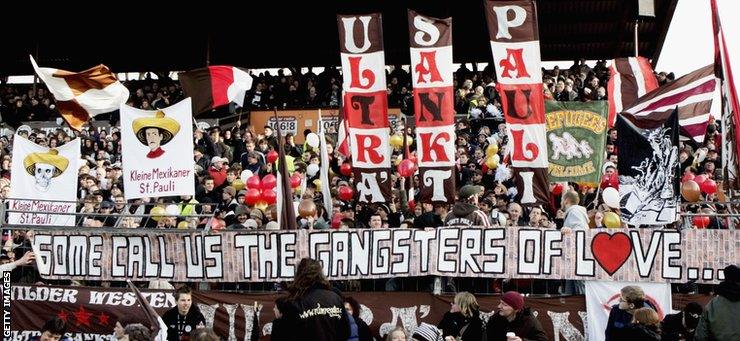
St Pauli have spent one of the past 18 seasons in Germany's top flight - but still attract a global fanbase
Money talks in football. It attracts the best managers, buys the best players - it even helps bring the game back from a global pandemic.
It supposedly leads to glory and joy. For some of the world's smaller sides, it often feels like the only path towards the top.
But one club, tucked away in Germany's second tier, does things a little differently. St Pauli are Hamburg's unapologetically political team.
The football here has never been distinctive. There is no grand silverware to display. St Pauli have spent just eight seasons in the Bundesliga in their history and, in 2011, finished bottom in their only top-flight campaign of the past 18 years.
This term they came close to relegation to the third division, yet merchandise sales exceed all but three of Germany's biggest sides. On match day, in more normal times, there is rarely a ticket going spare.
St Pauli's fervent global support has little to do with what happens on the pitch and everything to do with the culture surrounding it.
And now, at a time when many clubs will be left on the brink in the aftermath of the coronavirus outbreak, they offer a window on a more sustainable future in the modern game.

Banners and signs rejecting fascism, racism, homophobia and sexism are customary furniture at the Millerntor, the 29,500-capacity stadium where St Pauli's "way of life" is put on bold display.
It wasn't always this way. St Pauli were founded in 1910 but did not emerge as the unlikely beating heart of its working class district until the mid-1980s. Even then, the rebirth occurred through chance and circumstance.
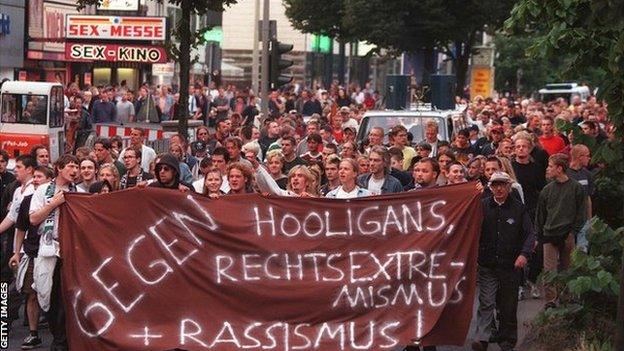
St Pauli fans display banners before a 1998 friendly match with city rivals Hamburg
Home to Hamburg's infamous red light district and the neon-lit "mile of sin", known as the Reeperbahn, the social dynamics in the port city's rebellious quarter provided the foundation for an identity which now unites more than 400 official supporter clubs across the globe.
There was no grand plan when a supporter from the local Hafenstrasse squats waved a pirate flag defiantly on the terraces as a light-hearted representation of poor St Pauli taking on the rich. But it was then that St Pauli was adopted as a footballing home for those seeking a different way.
The humble Millerntor, once attracting gates of just a few thousand, was transformed. The message behind the Jolly Roger symbol consolidated a fanbase prioritising social and political values. With an inclusive party atmosphere reflective of the district's alternative scene and aided by a rise from the third division to the Bundesliga in 1988, attendances boomed to sell-out crowds of more than 20,000.
Ever since plans for a new multi-purpose stadium were scrapped following organised fan protests in 1989, St Pauli have continued to stand proudly as perhaps the game's greatest tribute to fan power - as Michael Pahl, chair of the club's fan-founded museum, can attest.
"St Pauli is about authenticity," he says. "It's about doing things differently, finding your own way and staying true to your values as much as possible in a very commercialised environment.
"That's what St Pauli has been trying to do for decades. And it will forever remain a struggle."
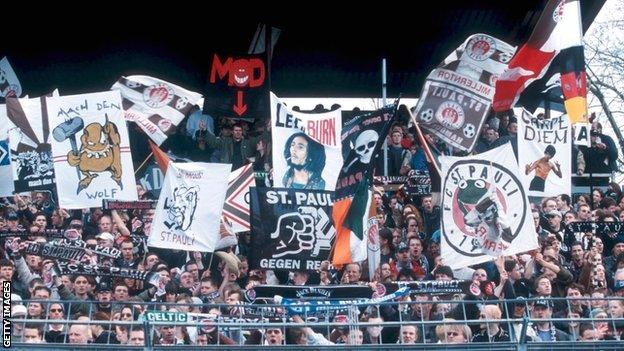
Colourful scenes from the Millerntor stands during a 2001 Bundesliga game
Though the challenges have evolved, the club remains inseparable from the gritty activism ingrained in its fanbase.
The values central to St Pauli's ethos are protected by 15 guiding principles, ranging from a commitment to the club's social responsibility to lobbying for supporter-friendly kick-off times.
An open dialogue with supporters is key. The fans have voted against selling the stadium's naming rights at a cost of millions to the club. The minutes before each game are kept free from publicity to allow uninterrupted chanting. Sexist men's magazine adverts have been driven out of the stadium which, during the 2006 World Cup, hosted a tournament for nations unrecognised by Fifa.
The football is undoubtedly important, but it has to align with the bigger picture.
Pahl, co-author of the club's 100th anniversary book in 2010, never looked back after attending his first game aged 14 in 1987. Hooked by the scenes on the terraces, his fascination with the club developed with his own political awareness.
"The club has developed a culture of listening to everyone's opinions and trying to find a compromise," he says. "It's not always possible to make everybody happy but it is something St Pauli is known for and I value a lot.
"The do-it-yourself spirit is very strong in the fan community and something that is very different. It defines what St Pauli is about. If I want to change something I can. When fans get active and organise, a lot of great things can happen.
"St Pauli really is my club. I can decide who is on the board and I can voice my opinion. To me, that's outstanding and sets the club apart."

St Pauli fans celebrate taking the lead over Dortmund in a 2010 Bundesliga game from a makeshift stand
There are inevitable daily challenges for a football club prioritising ethical and sustainable actions in a commercialised world. Just take the 'ghost games'.
Since German football resumed on 16 May, following a two-month hiatus because of the coronavirus pandemic, matches have been held behind closed doors under strict safety protocols. Spain, Italy and England have since followed suit.
The absence of fans at stadiums renowned for their vibrant support - not least in the Bundesliga, which averages the highest attendances of Europe's 'big five' leagues - has starved the action of atmosphere and emotion. Hence the term 'ghost games', or Geisterspiele.
While the return of football has been a welcome distraction for many, financial motivations in the form of broadcast obligations, sit uneasily with others.
For St Pauli president Oke Gottlich, the current crisis presents an important opportunity to discuss football's future.
"There is so much money involved now that we are forced to play games for TV and not for the fans," he says.
"This is really bad because football was always for the spectators and the people and it brings a togetherness. If you are a community-based club taking care of your region then a game without fans is a nightmare."
Gottlich, 44, is a long-time supporter himself. He started his own record label before being voted in as president by club members in 2014, and was also elected to the board of the German football league in August.
"We must ask, what are we doing? Is it a sport or is it economics?" he adds. "For me, it's a sport, that's priority number one. There is lots of TV money coming in and how we are sharing that money is a very important thing. Is it an interesting competition we are running? Or is it a competition where four or five clubs are always winning?
"I think the Covid-19 virus is bringing a potential mind shift. I'm really positive. I think we are learning in this pandemic and I really hope - and this is where I am a romantic and a fighter for community-based football - that we can create a model for competitive integrity, to create a level playing field and think in new ways.
"Community-based football is the sustainable way because it is carried by people. We do not have one investor but lots of people who care. But we shouldn't be too romantic about it, it helps so long as the management are making the most of the resources they have.
"At St Pauli we have established a sustainable way that avoids wild investment. Getting an economic balance while also building a sustainable football team is something we are in the midst of."
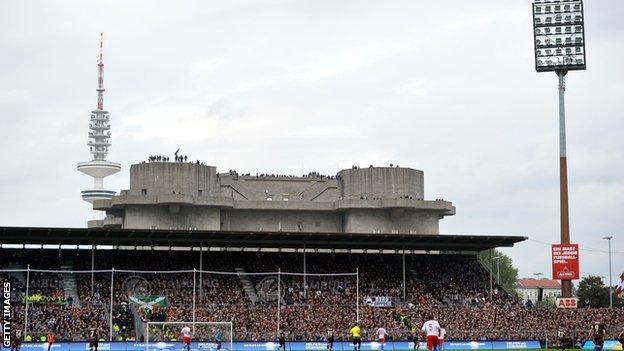
St Pauli's Millerntor stadium, pictured in 2010, with Hamburg's Heinrich Hertz TV Tower in the background and fans atop the nearby Feldstrasse World War Two bunker
There have been times when St Pauli's football has been so bad as to threaten their very survival. Successive relegations to the third tier left the club on the brink of financial ruin in 2003, before the fan base rallied to help plug a 1.95m euro (£1.74m) hole through the sale of brown T-shirts.
Another fall to the third division was dodged by a single point in 2015 and Jos Luhukay's side came close to the drop again this season.
"We definitely need to aim for higher goals," Gottlich says. "We're trying to find the right balance between our values and the need to be tough, structured and organised as a football club.
"It is a balancing act. As long as the members and fans want St Pauli to play professional football, they know we need to have some money coming in. We definitely want to perform because we see football as a platform also for social matters. We can make ourselves heard much better if we are successful.
"The art of management is trying to make more good decisions than bad ones. We take feedback very seriously in our member meetings and it leads to positive things. This is what St Pauli is about."
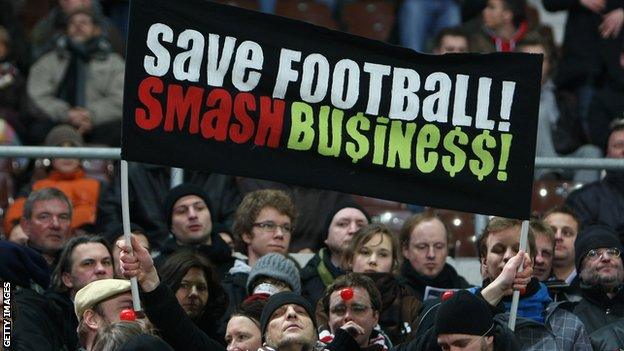
St Pauli's fanbase supports various social projects at a local and international level
The skull and crossbones symbol synonymous with St Pauli is worn boldly and waved proudly by supporters irrespective of results. The tension arrives when the delicate balance between business and values appears to fall out of sync.
Consistent hints of commercialisation during the club's last Bundesliga campaign in 2011 forced a reaction by the fans who feared the club had lost its identity.
The introduction of significant business seating in the new main stand, along with corporate boxes of which one had been rented to a local strip club, laid the foundations for unrest. An LED screen allowing supporters to pay to share their messages tipped the scales.
A letter titled 'enough is enough' was drafted by fans to the club. The Totenkopf symbol, once a light-hearted representation of the club's stand against the rich and later bought by the club for its merchandising potential, was turned red in protest.
"The fans felt the meaning behind the symbol was becoming empty and so they created a new one to take back the initiative and their club," Pahl explains.
"It led to discussions. They are always negotiating how we can make enough money without sacrificing too many of our values. The club is constantly trying to find the right way and there's always lively discussions going on.
"We don't make it easy on ourselves by taking these decisions, we limit ourselves to a certain point, but you must accept that if you're losing a source of income you cannot expect the club to be near the top of German football."
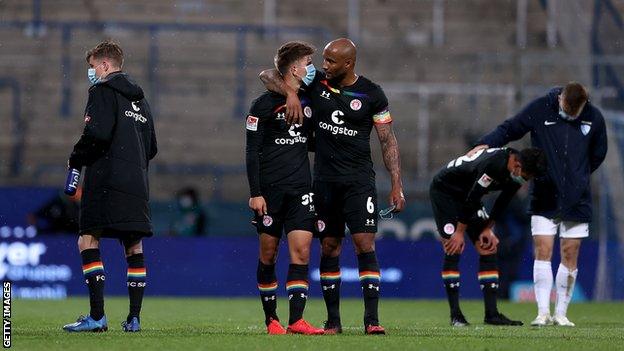
St Pauli are five points clear of the relegation play-off spot, with three matches remaining
As St Pauli's board wrestles with ensuring competitive football within the club's self-imposed social responsibilities, the fanbase continues to pursue social causes ranging from the support of the city's vulnerable squatter and refugee groups to initiatives supplying clean drinking water worldwide.
Doing things the St Pauli way - the odd Bundesliga season aside - may mean slow progress on the pitch. Yet, while the football might not be special, being part of the action at the Millerntor will always feel so.
"People could say we could make more of what we have, certainly if you see the possibilities the club has," reflects Pahl.
"It's so successful because it stands for something. That's what makes it appealing to a lot of people.
"This image that the club has is, to me, a miracle. To see how people identify with this club and the values shared by fan clubs all over the world, there's something fascinating about that."